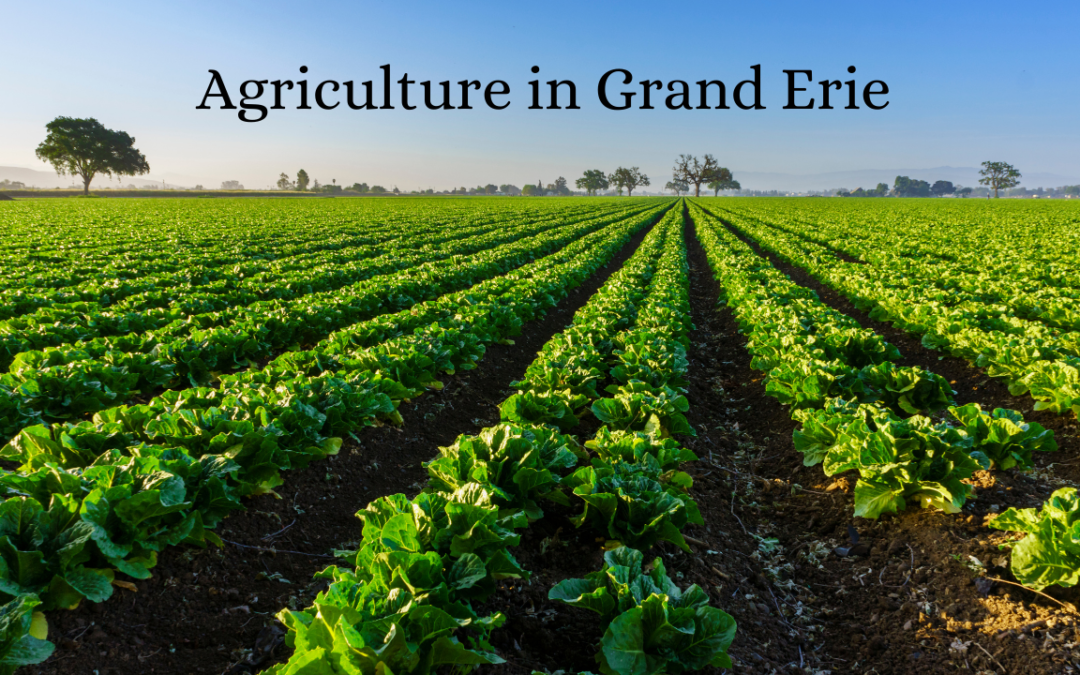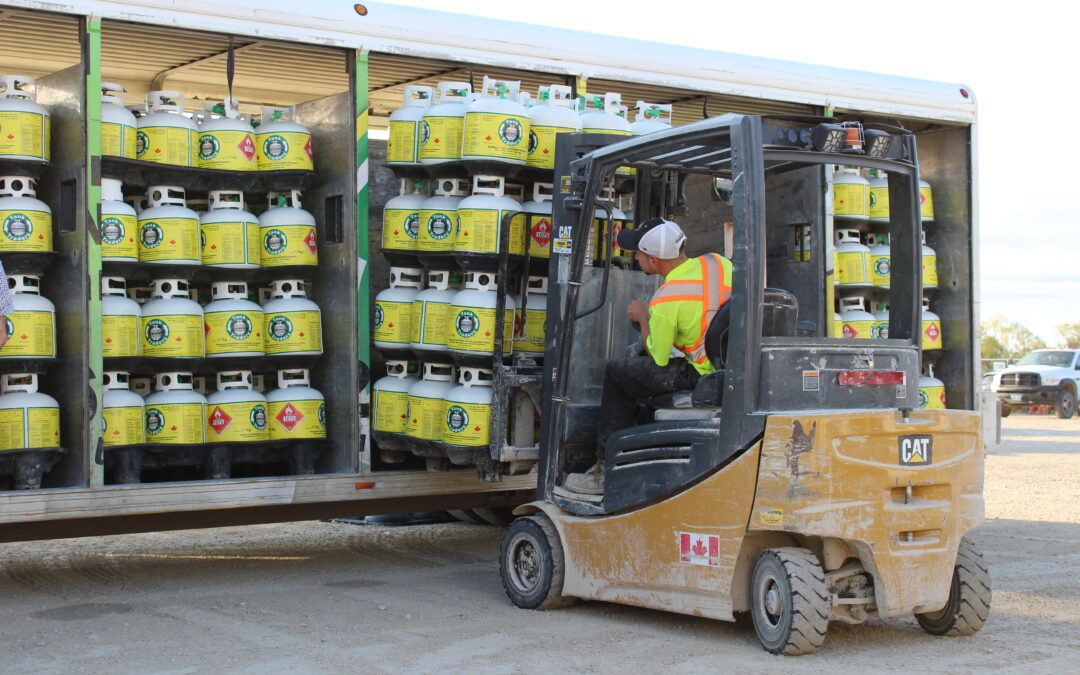
Ontario Agriculture Week – Spotlight on Grand Erie
It’s Ontario Agriculture Week from October 3rd to the 9th and there is plenty to celebrate about this important sector! The week is a time to showcase all the amazing things happening in the industry and our connection to where our food comes from – so let’s raise a fork to the food we love and the people who produce it!
The agriculture and agri-food sector is a major contributor to the Canadian economy comprised of primary agriculture (farmers) and food and beverage processing, and also includes foodservice providers, as well as food retailers and wholesalers who are the link between food production and consumers.
In 2021, the whole agriculture and agri-food system employed 2.1 million people, provided 1 in 9 jobs in Canada, and generated $134.9 billion (around 6.8%) of Canada’s gross domestic product (GDP). Of that, primary agriculture carried out by farmers and which is defined as work performed within the boundaries of a farm, nursery or greenhouse, accounted for 241,500 jobs in Canada and $31.9 billion in GDP across 189,874 farms.
Agriculture in the Grand Erie region…
There are 3564 agri-food businesses in Grand Erie region. Agriculture, combined with forestry, fishing and hunting, is the 2nd biggest industry in the Grand Erie region.
Grand Erie top 3 Agriculture subsectors are as follows:
- Crop production – 1844 businesses
- Animal production and aquaculture – 599 businesses
- Food service and drinking places – 502 businesses
The 2021 Census showed there were 3735 farm operators (down from 4,030 in 2016) in the Grand Erie region operating 2620 farms (down from 2860 in 2016). Around 40% of farms are under 70 acres, 47% are between 70 and 399 acres, 8% are between 400 and 759 acres and 6% are over 760 acres. Based on 894 farms that reported on number of employees, a total of 10,727 individuals were employed including temporary foreign workers.
Largely comprised of rural communities, the Grand Erie region has a diverse agricultural industry and its farms make up 5.42% of all farms across Ontario. Primary agriculture which relates directly to farming, includes crops, livestock, greenhouses and nurseries, as well as, farmer’s markets, farm equipment repair shops, wine and cider production, grain drying operations and livestock auctions is abundant in the Grand Erie region.
While the number of smaller farms shrunk between 2016 and 202, Grand Erie gained 7 large farms (2240 acres and higher) indicating that operations are merging in response to the shrinking number of farm operators.
Farms by industry group in Grand Erie:
- Oilseed and grain – 1175 farms
- Beef and cattle ranching and farming – 189 farms
- Vegetable and melon farming – 188 farms
- Greenhouse, nursery and floriculture – 143 farms
- Poultry and egg production – 113 farms
- Dairy cattle and milk production – 105 farms
In 2021, Grand Erie grew over 6 million kgs of fruit, 34 million kgs of vegetables, 15 kgs of grain, and 30 million kgs of livestock products. Top fruits include apples, strawberries and pears. Top vegetables are potatoes, tomatoes, carrots, onion and lettuce. Chicken, beef, eggs and dairy are top livestock products.
County of Brant: 77% of lands in the County of Brant are considered to be prime agricultural lands. Additionally, the County of Brant is home to various businesses with on-farm diversified uses such as bakeries, seasonal tourism events related to the agricultural area (petting zoo, corn maze, ziplining, wine tasting etc.), and educational & commercial activities directly related to local farming.
Brantford: Aside from deep roots in agricultural equipment manufacturing, local farm fresh stores are popular in Brantford and operations such as Brantwood Farms have adapted to receive customers year round at their farm shops and special events.
Haldimand County: Agriculture has a long history in Haldimand County. Family farms have been a staple to the local economy for generations, specializing in crop production, animal production and aquaculture. Haldimand County invites people to visit their farmers markets to learn how important agriculture is to the local economy and appreciate networks of local food producers.
Norfolk County: Norfolk County promotes itself as Ontario’s Garden and according to the 2016 census, there were 1,860 farm operators working 1,307 farms in Norfolk County, with total land in crops of 196,403 acres. Norfolk County farmers are Canada’s leading growers of asparagus, cabbage, tart cherries, ginseng, peppers, pumpkins, rye, squash and zucchini, strawberries, and other vegetables. Livestock makes up an important part of Norfolk County agriculture which include pigs, cattle and calves, goats, sheep and lambs and honeybee colonies. Employing the highest number of employees on its farms (7,619), Norfolk County farmers received more than $519 million in total gross farm revenue in the year prior to the 2016 census.
Six Nations of the Grand River: Corn, beans and squash are called “The Three Sisters” in Indigenous farming and were traditionally inter-planted because they thrive together – as well as providing balanced nutrition. To create community awareness surrounding Indigenous agriculture, Six Nations recently launched their “Revitalizing Our Sustenance Project” in May of 2020 during the beginning summer months of the COVID-19 pandemic.
Agri-tourism has been a growing industry across the Grand Erie region – from farm crawls to guided tours of micro-breweries, farmers markets and farm to table experiences, companies such as Ride the Bine, Red Apple Tours provide visitors and locals with tailored experiences at local agri-businesses.
Future outlook of Agriculture in Grand Erie…
According to StatCan’s Census of Agriculture data – of the 4, 030 farm operators in Grand Erie, about 55 % are 55 years or older, compared to 49% in 2011. 1,435 are between the age of 35-54 and only 375 were under the age of 35. With many agricultural workers opting to retire early, shortages of workers, including migrant workers, are creating a high demand for skilled equipment operators to support the local industry and it is increasingly important to consider how and by whom these newly vacant positions will be filled.
With the Workforce Planning Board of Grand Erie as one of its several partners, Conestoga College recently developed a 16 week Agricultural Equipment Operator Program. Completion of the program positions graduates to successfully enter a wide variety of agricultural operations.
Other local agricultural training institutions include the Ontario Agricultural College (OAC) of the University of Guelph. At its Ridgetown Campus, obtaining an Associate Diploma in Agriculture provides individuals with the training to manage a farm, work for a global agribusiness, finance agricultural innovation, advance new crop and livestock genetics, or work in advancing agriculture technology.
Fanshawe College offers an Agri-Business Management Program at its Simcoe campus, which equips graduates with understanding business fundamentals and industry specific training in agricultural production. Students gain knowledge in how to manage each step of the supply chain from farm to table and everything in between, with new technological advances and sustainable practices.













